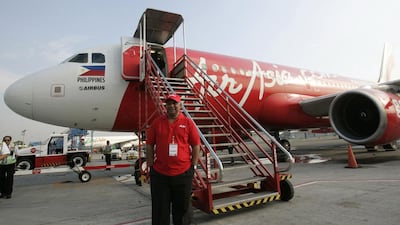Thailand’s Asia Aviation , a major shareholder in the budget carrier Thai AirAsia, said on Thursday the airline would take delivery of two new Airbus A320neos in the fourth quarter, raising its fleet to 51 planes at the end of this year.
Thai AirAsia, the country’s largest budget airline, also plans to operate new routes in Indochina and Indian markets such as Phuket to Siem Reap in Cambodia and Bangkok to Kolkata in India in the last quarter, it said.
The two new planes will push the capacity up to 186 seats from the previous model of 180 seats and save fuel burn by up to 15 per cent, the company said.
The budget carrier also plans to add the frequency on popular routes such as Bangkok to the tourist island Phuket, the southern province of Surat Thani and the north-eastern province of Udon Thani.
With the fleet expansion, Thai AirAsia expects to attract more customers and secure market share to maintain its leading position in the low-fare airline segment in Thailand.
Asia Aviation reported a net profit of 397 million baht (Dh41.5m) for July to September, up 333 per cent from a year earlier, due to strong passenger growth and lower fuel costs.
Thai AirAsia posted a third-quarter net profit of 729m baht, up 318 per cent from a year earlier, with revenue rising 12 per cent to 8.15 billion baht.
Asia Aviation owns 55 per cent in Thai AirAsia, while Malaysia’s AirAsia Bhd has an indirect 45 percent stake.
Other buyers of Airbus’ troubled re-engined A320 narrow-body jet are preparing for delays to the aircraft extending into next year as they scale back fleet plans and seek compensation.
IndiGo, India’s biggest airline, will operate fewer of the A320neo jets in the current financial year than previously estimated, while AerCap, which has more than 220 on order, said it expects the delays to continue into 2017. The US-based Air Lease said last week it is discussing financial remedies with the European plane maker with as many as eight deliveries now expected to be delayed next year.
Output of the A320neo is being disrupted by manufacturing delays at Pratt & Whitney, a unit of United Technologies that builds the plane’s geared turbofan engine. Pratt in September cut this year’s delivery target to 150 engines from 200, saying it could not produce certain parts fast enough.
“There’s a lot of uncertainty around the exact timetable for deliveries at the moment particularly those that are powered by the geared turbofan,” said the AerCap chief executive Aengus Kelly. He said he expects more clarity before the end of the year.
AerCap, the world’s largest independent lessor, has received only two of the 16 A320neos slated for the fourth quarter and said it does not know how many of deliveries would slide into 2017.
“We are working closely with our customer to resolve the issue and minimise any impact to their operations,” Pratt said. The company has said that the engine is achieving 99.9 per cent dispatch reliability while meeting promised performance on fuel burn and emissions reduction.
The A320neo is also powered by engines made by CFM International, a venture between General Electric and Safran. CFM has not seen delays. Some customers for the narrow-bodies are placing orders without choosing between Pratt’s turbine or its rival built by CFM International, Mr Kelly said.
AirAsia, Airbus’ top customer, received its first A320neos with the CFM engines in September. The Malaysian budget carrier is in talks with Airbus to bring forward deliveries for 2017, the AirAsia group chief executive Tony Fernandes has said.
IndiGo is now expecting to fly 20 A320neos at the end of March, compared with an earlier target of 24, said the president Aditya Ghosh.
* Agencies
business@thenational.ae
Follow The National's Business section on Twitter

